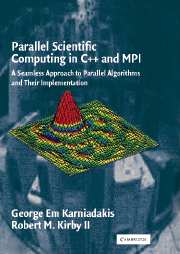 Parallel Scientific Computing in C++ and MPI
Parallel Scientific Computing in C++ and MPI Published online by Cambridge University Press: 05 October 2013
In this chapter we consider explicit discretizations of space and time derivatives. In such discretizations we can express directly a derivative at one grid point in terms of function values at adjacent grid points (spatial discretizations) or in terms of previous time levels (temporal discretizations). This, in turn, implies that there is no implicit coupling, and thus no matrix inversion is involved; instead, only simple daxpy type operations are required.
The material in this chapter is relatively easy to program both on serial as well as on parallel computers. It is appropriate for demonstrating fundamental concepts of discretization and primary constructs of the C++ language and of the MPI library. Specifically, we will demonstrate the use of loops, arrays, functions, and passing functions to functions. In addition to presenting MPI_Send and MPI_Recv implementations for finite differences, we also introduce MPI_Sendrecv and MPI_Sendrecv_replace as alternative advanced MPI function calls for parallelizing finite differences discretizations.
EXPLICIT SPACE DISCRETIZATIONS
Basics
The formulation of derivatives based on function values on a set of points, which we call the grid, dates back to Euler in the beginning of the eighteenth century. However, advances have of course been made since then. In this section, we will formulate ways to compute first- and higher order derivatives of a function using discrete data points. The key idea is to use Taylor expansions at a subset of adjacent points of the grid, as shown in Figure 5.1.
To save this book to your Kindle, first ensure [email protected] is added to your Approved Personal Document E-mail List under your Personal Document Settings on the Manage Your Content and Devices page of your Amazon account. Then enter the ‘name’ part of your Kindle email address below. Find out more about saving to your Kindle.
Note you can select to save to either the @free.kindle.com or @kindle.com variations. ‘@free.kindle.com’ emails are free but can only be saved to your device when it is connected to wi-fi. ‘@kindle.com’ emails can be delivered even when you are not connected to wi-fi, but note that service fees apply.
Find out more about the Kindle Personal Document Service.
To save content items to your account, please confirm that you agree to abide by our usage policies. If this is the first time you use this feature, you will be asked to authorise Cambridge Core to connect with your account. Find out more about saving content to Dropbox.
To save content items to your account, please confirm that you agree to abide by our usage policies. If this is the first time you use this feature, you will be asked to authorise Cambridge Core to connect with your account. Find out more about saving content to Google Drive.